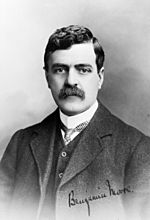Benjamin Moore (biochemist) facts for kids
Quick facts for kids
Benjamin Moore (biochemist)
|
|
|---|---|

Benjamin Moore (biochemist)
|
|
| Born | 14 January 1867 |
| Died | 3 March 1922 |
| Nationality | British |
| Alma mater | Queen's College, Belfast Royal University of Ireland |
| Known for | Biochemical Journal |
| Scientific career | |
| Fields | Biochemistry |
Benjamin Moore (born January 14, 1867 – died March 3, 1922) was an important early British biochemist. Biochemistry is the study of the chemical processes that happen inside living things. He became the first professor of biochemistry in the UK. He also started the Biochemical Journal, which was one of the first science magazines about biochemistry.
Contents
Becoming a Scientist
Benjamin Moore studied at Queen's College, Belfast and the Royal University of Ireland. Early in his career, he worked on how the body works (called physiology) at Yale University in the United States. He also worked at Charing Cross Hospital in London.
In 1902, the first department for biochemistry in Britain was created at the University of Liverpool. A ship owner named William Johnston gave money to start it. Benjamin Moore became the first professor there, holding the "Johnston Chair" in biochemistry.
Moore is also known for being one of the first people to use the words "National Health Service." He helped set up a group called the State Medical Service Association. This group worked towards creating a national healthcare system in the UK.
Helping During Wartime
During the First World War, Moore worked for the Medical Research Council in London. From 1916 to 1917, he worked with Guy Alfred Wyon and T.A. Webster. They solved a big problem: people working in British shell factories were getting sick from TNT poisoning. This poisoning could even be deadly.
Their work helped prevent more deaths. The government kept their discovery a secret until 1921. They did this to keep people's spirits up during the war. In 1920, Moore became a professor of biochemistry at the University of Oxford.
Building Biochemistry in the UK
Benjamin Moore was very important in helping the field of biochemistry grow in the UK. In 1906, he started the Biochemical Journal. His research assistant, Edward Whitley, helped him with money.
Even though they sold the Biochemical Journal in 1912, Moore stayed involved. He was on the editorial committee until 1921. He also published more of his own research papers in the journal. In 1911, he helped create the Biochemical Society, a group for scientists in this field.
His Idea of "Biotic Energy"
For many years, Moore studied the tiny parts and structure of living things. He thought that life couldn't be fully explained by just physics and chemistry. He also didn't think it was only about spiritual ideas.
Instead, he came up with a theory called "biotic energy." He wrote about this in his books The Origin and Nature of Life (1913) and Biochemistry (1921). He believed there was a special kind of energy in living bodies. This energy, he thought, couldn't be described using only the rules of physics and chemistry.
Awards and Family Life
In 1912, Benjamin Moore was chosen as a fellow of the Royal Society. This is a very high honor for scientists in the UK.
He was married and had three children. Sadly, his wife died suddenly in 1913. His son, Thomas Moore (1900–1999), also became a biochemist. He studied nutrition and became a leader at a famous nutrition research lab.
Benjamin Moore passed away from pneumonia in Oxford in 1922.
Some of His Works
- Moore B, Eadie ES, Abram JH. (1906) On the treatment of diabetes mellitus by acid extract of duodenal mucous membrane. Bio-Chem J 1: 28–38
- Moore B (1910) The Dawn of the Health Age
 | Frances Mary Albrier |
 | Whitney Young |
 | Muhammad Ali |

